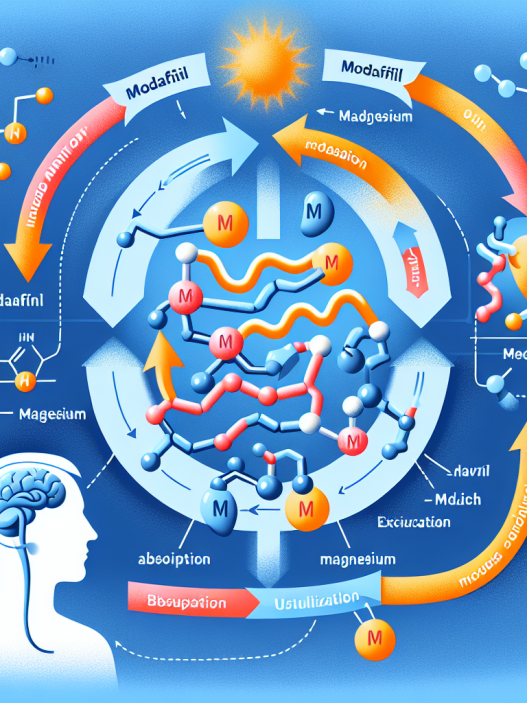-
Table of Contents
«Say goodbye to digestive troubles with Magnesium – the ultimate solution for a healthy gut!»
Introduction
Digestive difficulties can be a common issue for many individuals, and magnesium has been known to play a role in these problems. Magnesium is an essential mineral that is involved in various bodily functions, including digestion. However, when there is an imbalance or deficiency of magnesium in the body, it can lead to digestive issues such as constipation, bloating, and abdominal discomfort. In this article, we will discuss the potential causes of digestive difficulties related to magnesium and explore some solutions to help alleviate these problems.
5 Common Digestive Issues Caused by Magnesium Deficiency and How to Solve Them
Magnesium is an essential mineral that plays a crucial role in various bodily functions. It is involved in over 300 biochemical reactions, including muscle and nerve function, blood pressure regulation, and energy production. Despite its importance, many people are deficient in magnesium, which can lead to various health issues, including digestive problems.
In this article, we will discuss five common digestive issues caused by magnesium deficiency and how to solve them.
1. Constipation
One of the most common digestive issues associated with magnesium deficiency is constipation. Magnesium helps regulate muscle contractions in the digestive tract, and a lack of it can lead to slow movement of stool through the intestines, resulting in constipation.
To solve this issue, increasing your magnesium intake through diet or supplements can help. Foods rich in magnesium include leafy greens, nuts, seeds, and whole grains. You can also take magnesium supplements, but be sure to consult with your doctor first.
2. Bloating and Gas
Another common digestive issue caused by magnesium deficiency is bloating and gas. Magnesium helps relax the muscles in the digestive tract, allowing food to move through smoothly. When there is a lack of magnesium, these muscles can become tense, leading to bloating and gas.
To alleviate this issue, increasing your magnesium intake can help. Additionally, incorporating probiotic-rich foods into your diet, such as yogurt and fermented vegetables, can also aid in digestion and reduce bloating and gas.
3. Acid Reflux
Acid reflux, also known as heartburn, is a common digestive issue that occurs when stomach acid flows back up into the esophagus. Magnesium deficiency can contribute to this issue by causing the lower esophageal sphincter (LES) to relax, allowing stomach acid to escape.
To solve this issue, increasing your magnesium intake can help relax the LES and prevent acid reflux. Additionally, avoiding trigger foods such as spicy and acidic foods can also help alleviate symptoms.
4. Irritable Bowel Syndrome (IBS)
Irritable Bowel Syndrome (IBS) is a common digestive disorder that affects the large intestine. It is characterized by symptoms such as abdominal pain, bloating, and changes in bowel habits. While the exact cause of IBS is unknown, magnesium deficiency has been linked to this condition.
To manage IBS symptoms, increasing your magnesium intake can help regulate bowel movements and reduce abdominal pain. Additionally, incorporating stress-reducing activities such as yoga and meditation can also help manage IBS symptoms.
5. Inflammatory Bowel Disease (IBD)
Inflammatory Bowel Disease (IBD) is a chronic condition that causes inflammation in the digestive tract. It includes conditions such as Crohn’s disease and ulcerative colitis. Magnesium deficiency has been linked to IBD, as it plays a role in regulating the immune system and reducing inflammation.
To manage IBD symptoms, increasing your magnesium intake can help reduce inflammation in the digestive tract. Additionally, incorporating anti-inflammatory foods such as fatty fish, olive oil, and turmeric into your diet can also aid in managing symptoms.
In conclusion, magnesium deficiency can lead to various digestive issues, including constipation, bloating, acid reflux, IBS, and IBD. To solve these issues, increasing your magnesium intake through diet or supplements can help. Additionally, incorporating other lifestyle changes such as stress reduction and incorporating anti-inflammatory foods can also aid in managing these digestive issues. If you are experiencing persistent digestive issues, be sure to consult with your doctor to determine the underlying cause and develop a personalized treatment plan.
The Role of Magnesium in Digestive Health and How to Incorporate It into Your Diet
Magnesium is an essential mineral that plays a crucial role in various bodily functions, including digestion. It is involved in over 300 biochemical reactions in the body, making it a vital nutrient for overall health. However, despite its importance, many people struggle with digestive difficulties when consuming magnesium. In this article, we will explore the role of magnesium in digestive health and provide solutions on how to incorporate it into your diet.
Firstly, let’s understand why magnesium is essential for digestion. This mineral helps to relax the muscles in the digestive tract, allowing food to move smoothly through the system. It also stimulates the production of digestive enzymes, which break down food into smaller particles for better absorption. Additionally, magnesium plays a role in maintaining a healthy balance of gut bacteria, which is crucial for proper digestion.
One of the most common digestive difficulties associated with magnesium is diarrhea. This is because magnesium has a laxative effect, meaning it can increase the frequency of bowel movements. While this may be beneficial for those struggling with constipation, it can be problematic for those with already sensitive digestive systems. The key to avoiding this issue is to consume magnesium in the right form and dosage.
Magnesium citrate and oxide are two forms of magnesium that are known to have a laxative effect. Therefore, it is best to avoid these forms if you are prone to diarrhea. Instead, opt for magnesium glycinate or malate, which are less likely to cause digestive issues. It is also essential to start with a low dosage and gradually increase it to avoid any sudden changes in bowel movements.
Another common digestive difficulty associated with magnesium is bloating and gas. This is because magnesium can draw water into the intestines, leading to bloating and discomfort. To avoid this, it is crucial to stay hydrated when consuming magnesium and to spread out your intake throughout the day. It is also recommended to take magnesium with a meal to help with absorption and reduce the risk of bloating.
Incorporating magnesium-rich foods into your diet is an excellent way to ensure you are getting enough of this essential mineral. Dark leafy greens, nuts and seeds, whole grains, and legumes are all excellent sources of magnesium. However, it is essential to note that the amount of magnesium in these foods can vary depending on the soil they are grown in. Therefore, it may be beneficial to supplement with magnesium to ensure you are meeting your daily requirements.
When choosing a magnesium supplement, it is crucial to opt for a high-quality product from a reputable brand. Look for supplements that are third-party tested and have a good reputation for quality and purity. It is also essential to consult with a healthcare professional before starting any new supplement, especially if you have a pre-existing digestive condition.
In conclusion, magnesium plays a vital role in digestive health, but it can also present some challenges for those with sensitive digestive systems. By choosing the right form and dosage, staying hydrated, and incorporating magnesium-rich foods into your diet, you can reap the benefits of this essential mineral without experiencing any digestive difficulties. Remember to always consult with a healthcare professional before making any significant changes to your diet or supplement routine. With the right approach, you can enjoy the many benefits of magnesium for your overall health and well-being.
Natural Remedies for Digestive Problems Caused by Excessive Magnesium Intake
Magnesium is an essential mineral that plays a crucial role in various bodily functions. It is involved in over 300 biochemical reactions, including muscle and nerve function, blood pressure regulation, and protein synthesis. However, like any other nutrient, too much of it can have adverse effects on the body. Excessive intake of magnesium can lead to digestive problems, causing discomfort and inconvenience. In this article, we will discuss the difficulties that can arise from excessive magnesium intake and explore natural remedies to alleviate these digestive issues.
One of the most common digestive problems associated with excessive magnesium intake is diarrhea. Magnesium is a natural laxative, and when consumed in large amounts, it can cause the stool to become loose and watery. This can be particularly troublesome for individuals who already have a sensitive digestive system. Diarrhea can lead to dehydration, electrolyte imbalances, and nutrient deficiencies if not addressed promptly.
Another digestive issue that can arise from excessive magnesium intake is bloating and gas. Magnesium can have a relaxing effect on the muscles, including those in the digestive tract. This can slow down the movement of food through the intestines, leading to bloating and gas. These symptoms can be uncomfortable and embarrassing, causing individuals to avoid social situations and affecting their overall quality of life.
Fortunately, there are natural remedies that can help alleviate these digestive problems caused by excessive magnesium intake. The first and most crucial step is to reduce magnesium intake. This can be achieved by avoiding foods that are high in magnesium, such as nuts, seeds, legumes, and leafy greens. It is also essential to read labels carefully and avoid magnesium supplements unless prescribed by a healthcare professional.
Another natural remedy for digestive problems caused by excessive magnesium intake is to increase water intake. Diarrhea can lead to dehydration, so it is crucial to replenish lost fluids by drinking plenty of water. Staying hydrated can also help alleviate bloating and gas by promoting regular bowel movements.
Probiotics are another natural remedy that can help with digestive issues caused by excessive magnesium intake. Probiotics are live bacteria and yeasts that are beneficial for gut health. They can help restore the balance of good bacteria in the gut, which can be disrupted by excessive magnesium intake. Probiotics can be found in fermented foods like yogurt, kefir, and sauerkraut, or in supplement form.
In addition to probiotics, incorporating fiber-rich foods into the diet can also help alleviate digestive problems caused by excessive magnesium intake. Fiber can help regulate bowel movements and promote the growth of good bacteria in the gut. Foods such as whole grains, fruits, and vegetables are excellent sources of fiber.
Herbal remedies can also be beneficial in alleviating digestive problems caused by excessive magnesium intake. Ginger, for example, has anti-inflammatory properties that can help soothe an upset stomach. Peppermint is another herb that can help alleviate bloating and gas by relaxing the muscles in the digestive tract. These herbs can be consumed in tea form or taken as supplements.
In conclusion, while magnesium is an essential mineral for our overall health, excessive intake can lead to digestive problems such as diarrhea, bloating, and gas. By reducing magnesium intake, staying hydrated, incorporating probiotics and fiber-rich foods into the diet, and using herbal remedies, these digestive issues can be alleviated. It is always essential to consult with a healthcare professional before making any significant changes to your diet or taking supplements. With the right approach, it is possible to maintain a healthy balance of magnesium in the body and avoid digestive problems caused by excessive intake.
Q&A
1. ¿Cuáles son algunas de las dificultades digestivas asociadas con el consumo de magnesio?
Algunas de las dificultades digestivas comunes asociadas con el consumo de magnesio incluyen diarrea, náuseas, vómitos, calambres estomacales y flatulencia.
2. ¿Por qué el magnesio puede causar problemas digestivos?
El magnesio es un mineral que puede actuar como un laxante natural en el cuerpo. Cuando se consume en grandes cantidades, puede estimular los músculos del intestino y causar diarrea y otros síntomas digestivos.
3. ¿Existen soluciones para las dificultades digestivas causadas por el magnesio?
Sí, hay varias soluciones para ayudar a aliviar las dificultades digestivas causadas por el magnesio. Estas incluyen reducir la dosis de magnesio, tomarlo con alimentos, elegir una forma de magnesio más fácil de digerir y asegurarse de beber suficiente agua para ayudar a prevenir la deshidratación. También es importante hablar con un médico si los síntomas persisten o empeoran.
















